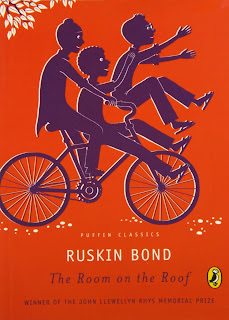The Room on
the Roof is the first novel of Ruskin Bond. He wrote this novel when he was in
England for four years, struggling for both: job and writing.
Well, the book
is staged against a small Indian town. It covers the events of a teenager
English boy Rusty - he is an orphan and loneliness is something that never
leaves him.
The theme of
the story is based on teenage rebellion. Rusty lives in an European colony
located in the outskirts of Dehradun with his guardian, Mr. Harrison. The
guardian forces a regimented environment over him and often beats him with a
cane upon finding him at a mistake. By no way, the guardian was like his
father.
The story is
of 1950s when India was recently gained independence from the Britishers and
the matter of racism was very much evident in Mr. Harrison's behaviour since he
often told Rusty that going to bazaar means India, Indians epitomize dirt and
commotion. He is wary of Indians and their cultures.
He wants Rusty
to behave like him, a sort of puppet: high on English grace and modesty.
However, Rusty feels suffocated being with him. His subconscious is well
leaping ahead for a fight and freedom. He wants to live the life on his own
terms without having rules and elderly vigilance.
One morning
when it was drizzling, Rusty was walking home and that time a boy called Somi
lifted him on his bicycle and soon later a few more friends of Somi got on the
bicycle. Having seen boys enjoying their lives and some glimpses of bazaar, Rusty
feels profoundly about his freedom to roam about in the city.
The climax
comes in drastically on the occasion of Holi, when Ranbir, one of his Indian
friends, forcibly makes way for him and pulls him away for playing with
colours. Rusty enjoys the full day with them and when he returns home smeared
in the dirt of colours, Mr. Harrison refuses to recognise him but when he does
he begins beating him brutally.
Rusty already
simmering in the waves of revolt, pays him back by hitting him hard in his face
and when the missionary's wife approaches him Rusty runs away from the window.
He spends the
rainy night out of home, the friends who were with him in the daylight was not
there. That time he understands the harsh reality of the world and the misery of
being an orphan haunts him.
In the morning, Somi collects him from around the chaat shop and takes him to his home. Though Rusty is in grave danger of dying of starvation or becoming a beggar because of an uncertain future but he is determined not to go back to the guardian’s home.
To earn his
livelihood, Somi arranges Rusty in a teaching job. He is to tutor English
lessons to Kishen, a Punjabi boy younger to him. His parents Mr. and Mrs.
Kapoor offer him food and to live in a room on the roof devoid of all basic
amenities but high on freedom. That was enough for him.
Mr. Kapoor is
an incorrigible drunkard and some twenty years older than his beautiful wife
Meena Kapoor. Rusty is so much awestruck by her beauty that he falls in love
with her.
Even she
responds to his feelings, and one day they kiss in the jungle while out for a
picnic. Meena falls in love with Rusty because her husband holds no special
bonding for her and is always in a drunken state. She is fed up of him.
Unfortunately,
their love story could not proceed ahead. One day, Mr. and Mrs. Kapoor leave
for Delhi. After a few days, Rusty and Kishen receive a telegram informing the
death of Meena in a car accident.
Kishen breaks
down drastically while Rusty feeling alone once again plunges into the ravines
of depression and self-pity. Life becomes a slow poison for him.
Soon Kishen is
received by his aunty from Hardwar and Rusty becomes alone and friendless.
After spending some days without any enthusiasm and no aspirations in sight,
Rusty decides to go to England and for that he first needs to go to the British
consulate in Delhi for having a passage arranged for him.
He starts his
journey but gets down at Hardwar to see Kishen one last time. There he finds
that Mr. Kapoor has remarried and Kishen has taken thieving as a way of life -
he has become a run-away kind of person and is wanted by police. Rusty meets him
and tells him to stop thieving.
Ruskin Bond
wrote this book when he was just seventeen. The book is high on teenage rebel
and many of the events spiral up from his own life. After reading many Ruskin Bond books you may come to know that he had a sad and dull childhood and while
growing up he longed for everything that a normal teenage could expect.
The other
aspect of this book is the deteriorating condition of orphans in the society.
Being orphan means independent but at the same time one has to struggle hard
for basic things like shelter, security, food, education and so on. The Room on
the Roof is one of the finest books ever penned down by this legendary writer.
The narration technique is simply gorgeous.
Well, you can always read the
character sketch of Rusty here: http://www.keveinbooksnreviews.in/2018/11/character-sketch-of-rusty-in-novel-room.html

It is easy to understand.
ReplyDeletelittle tuff
Deleteloved it thanx :)
ReplyDeletethank u so much bro luv u sooo much dearie ... ❤️😍
ReplyDeleteHi thanks for it I love 💕 it
ReplyDeletelovely
ReplyDelete